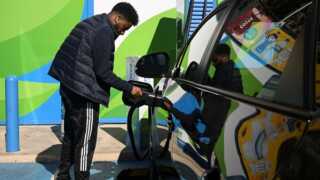By: Mainak Das
| Updated on: 27 Aug 2025, 09:18 am Share via: Lithium-ion, being the key raw material for EV batteries and its supply chain being controlled heavily by China, is a high-risk zone for investors in India if they want to set up a local manufacturing facility. …Read More Lithium-ion, being the key raw material for EV batteries and its supply chain being controlled heavily by China, is a high-risk zone for investors in India if they want to set up a local manufacturing facility. (REUTERS) Get Launch Updates on Notify me The risk associated with sourcing lithium owing to the over-dependence on China as the only source is one of the key reasons deterring investment in cell manufacturing in India, believes Maruti Suzuki Chairman RC Bhargava. His comment comes on the heels of another supply chain disruption the Indian auto industry has witnessed owing to the curb on exports of rare earth magnets by the Chinese government. Bharagava’s comment comes at a time when Maruti Suzuki has just commenced exports of the company’s first-ever electric car e Vitara, to more than 100 countries. Also, the company started production of lithium-ion battery cells at the electrode level for strong hybrid electric vehicles in the brand’s Gujarat plant. Bhargava also hoped that Indian scientists would be able to come up with technologies that could solve reliance on external supplies. “We don’t make EV batteries yet. Nobody is making battery cells in India. One of the problems of EVs today is that people are packaging the cells into batteries, but actual production of cells is not taking place in India,” he said. EV battery manufacturing is highly capital-intensive propositionBhargava asserted that setting up plants for the production of battery cells is a very capital-intensive proposition. Citing industry estimates, the Maruti Suzuki Chairman said that such a project could cost about ₹20,000 crore. He also stated that there is a very high risk involved for the investors. “The raw material lithium is a problem. If I put up a plant, if the raw material is not available to me, as an investor, what is my risk, especially if the raw material is controlled by one supplier?” he said. This is one of the factors that is making investors stay away from making investments in local battery cell manufacturing in India. In light of the Chinese government’s decision to curb exports of rare earth magnets that caused quite a disruption in the Indian automotive market, resulting in the auto OEMs and component manufacturers hitting the panic button and lobbying the Indian government, Bharagava’s genuine concern is how investors can protect themselves against the arbitrary decision by the supplier. How to solve the problem?When it comes to addressing the aforementioned concern, forging partnerships could be a potential solution. Bhargava said that in such cases, one can join hands with a Chinese company, give them the majority stake and let them set up the facility in India, and thus the Chinese company assures its local partner of the supply of raw material. However, no company in India so far no one has done it yet. Interestingly, Maruti Suzuki’s subsidiary TDS Lithium-Ion Battery Gujarat Pvt Ltd (TDSG) has become the first company in the country to achieve electrode-level localisation of lithium-ion battery cells. It has started manufacturing of the first lithium-ion battery, cell and electrode for a strong hybrid electric vehicle at the facility in Gujarat. TDSG started production of batteries for mild hybrid vehicles in 2021 and has since produced battery packs for a total of over 10 lakh vehicles. It has made a total investment of ₹4,267 crore and has a planned expansion of 12 million cells per annum. Check out Upcoming EV Cars in India. First Published Date: 27 Aug 2025, 09:18 am IST
Source: hindustantimes.com






